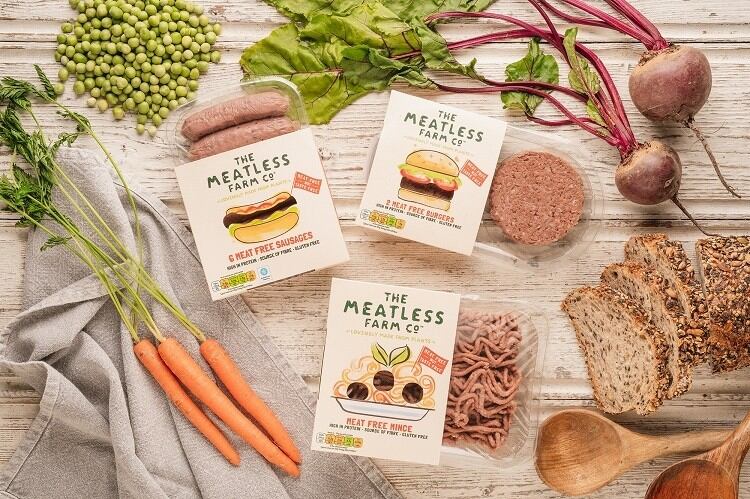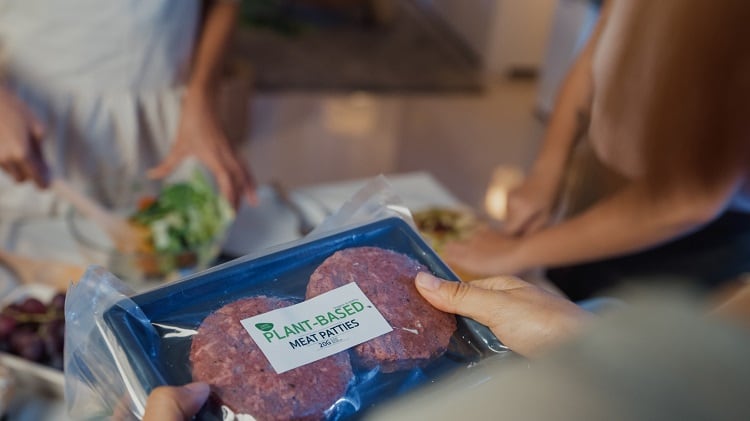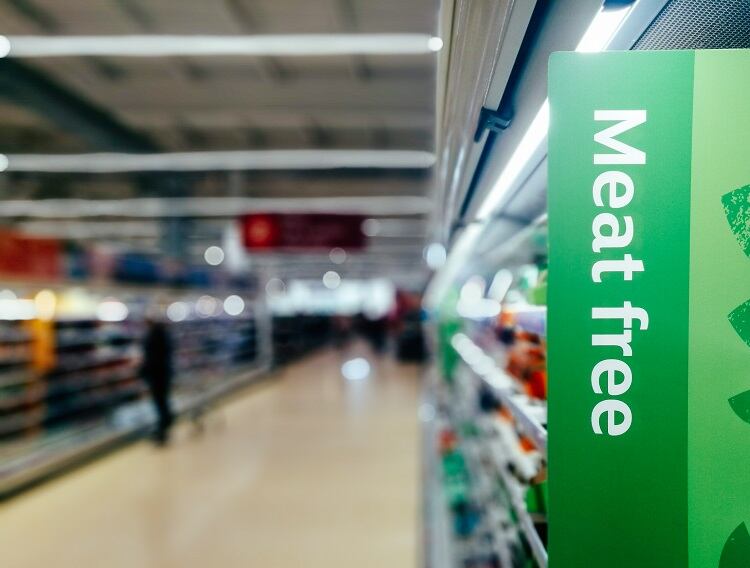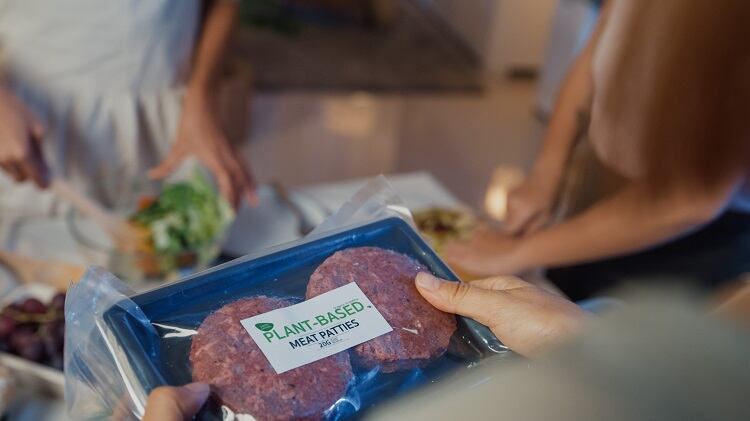UK meat analogue maker Meatless Farm has fallen into administration. While the company has not made an official statement, insolvency firm Kroll announced its appointment of Geoff Bouchier and Benjamin Wiles as joint administrators of the plant-based brand. Kroll has been ‘exploring all options’ for the business, we were told.
Meatless Farm is not the only casualty of the plant-based meat sector of late. Plant-based co-manufacturer Plant & Bean, which manufacturers products for Quorn amongst others, also recently appointed administrators citing inflationary challenges, while sausage maker Heck has cut most of its vegan range.
Do these setbacks suggest the plant-based sector is facing a particularly challenging period? Should we remain hopeful for the future of meat alternatives in the UK and further afield? FoodNavigator investigates.
Meatless Farm: What we know so far
That trouble was brewing at the Leeds-headquartered company had become apparent in recent weeks. Last month, The Grocer – a trade title owned by FoodNavigator publisher William Reed – reported Meatless Farm’s hiring of Kroll alongside founder Morten Toft Bech’s justification that a ‘big investor’ had withdrawn from a commitment to invest.
“This caught the board and the management team of MF by surprise because our cash runway was timed to this anticipated incoming investment,” he told the publication in a statement.
Then last week, more news came via social media platform LinkedIn as a number of Meatless Farm employees changed their status to ‘open to work’.
Commercial director Tim Offer posted that his time at Meatless Farm had ‘come to an end’. “After a fantastic 10 months leading a talented and highly engaged sales team the business has unfortunately made all the teams redundant.” According to founder Bech’s LinkedIn page, his position at Meatless Farm also finished up this month.
Accounts filed with Companies House suggest the business had not been breaking even in recent years. Financial results for the year ended 31 December 2021 revealed an operating loss of £22.9m (€26.72m).
A hyped sector with more casualties on the way?
For some, Meatless Farm’s fall into administration is somewhat of a dead canary in a coal mine: a signal the ‘hyped’ sector is seriously struggling for financial viability.
According to director of consultancy New Nutrition Business Julian Mellentin, the plant-based meat sector has largely been funded by ‘tech and finance bros’ who have not taken the time to understand the technology nor consumer demands. “Most meat substitute business models have ignorance of the consumer and the food and beverage market baked into them,” he told FoodNavigator.
“The disappointment experienced by Meatless Farm and many others is the result of how too many people in our industry have fallen for the echo chamber of lazy thinking which created a myth that there was going to be a ‘plant-based meat revolution’.”
Mellentin believes the plant-based meat substitutes market can be niche at best. The plant-based meat substitute business – in the UK, US and elsewhere – is on track to be one of the biggest fails in food industry history, he told us. “The delusions of investors who attempted to apply the Silicon Valley growth model to the much tougher world of food are being shredded by contact with reality.”
And in a category driven by ‘investor and media hype’ and opposed to consumer need, many brands are failing to make a profit, Mellentin stressed. New Nutrition Business looked into the financials of the top-20 brands in the UK market and reported nine were running losses ‘way out of proportion of their sales’. “Together, these nine had cumulative losses of £130m (€151.8m) on their balance sheets with annual sales of just £70m.
“After Meatless Farm, many, many meat substitute brands will go under over the next three years.”

Although much more optimistic than Mellentin, alternative protein advocate Good Food Institute (GFI) Europe similarly suggested casualties are not unexpected.
“The news about redundancies at Meatless Farm is clearly very unfortunate, and my thoughts go out to everyone affected,” Helen Breewood, research and resource manager at GFI Europe told this publication.
Many food companies, including conventional meat producers, are struggling amid issues including rising inflation, she explained, adding that those in the fledging plant-based meat sector – which often depends on private investments – are particularly exposed.
“This sector continues to mature and expand beyond the initial hype that fuelled its early growth, and as with any rapidly developing industry, sadly it is inevitable that we will see some companies fail.”
Questioning meat mimicry: ‘Why make vegetables look like something they are not’
That the plant-based meat sector is struggling is a view shared by proponents of the meat industry.
As the British Meat Processors Association (BMPA) understands it, ‘nearly all’ the meatless plant-based companies are struggling for financial viability, chief executive Nick Allen told FoodNavigator. “And that’s not just here in the UK, but across Europe as well.”
Allen predicts the plant-based meat sector will ‘continue to struggle’ and ‘not be attractive to investors’.
The BMPA also agrees with Mellentin that plant-based meat products fail to meet consumer demands, suggesting that meat mimicry achieved via ultra-processing methods is not the solution to achieving a ‘healthy balanced diet’.
“I don’t think the interest was ever there from the consumer in the first place,” Allen told FoodNavigator. “And as people realise these products are highly processed foods with all the concerns there are that go with them, they are turning away from them.”
The BMPA chief executive argues that vegetables are an important part of a healthy balanced meat, as is meat, and it is ‘much’ healthier to eat fresh food rather than processed food. “So I think everyone would do better to concentrate on how vegetables are presented and made attractive and appealing to the consumer rather than process them and try and make them looking something they are not.”

Presentation, for New Nutrition Business’ Mellentin, is not the only concern. With the exception of mycoprotein major Quorn, the New Nutrition Business director believes meat substitute brands fail to meet consumers’ expectation of taste and texture. “The state of the technology is such that these problems cannot be overcome any time soon.”
Having marketed itself ‘aggressively’ over the last five years or so, plant-based meat products have been readily available for consumers to try, he continued. “That means lots of people have tried the products available and found that they just don’t taste good enough.
“Meat reducers instead just eat more vegetables, or chicken or fish. The vegan niche prefers whole foods over faux meat. And people who want ‘plant based’ want more vegetables, herbs and spices – not a 10-ingredient soy burger.”
A ‘turning point’ for the plant-based meat category
Others are more buoyant about the future of the plant-based meat substitute category.
Plant-based cheese brand Julienne Bruno, for example, suggests the recent demise of some plant-based meat brands marks a ‘turning point’ for the category. “I think we’ll look back and remember this as a turning point for the plant-based category – it’s not the end of a ‘fad’ but plant-based is reaching a mass tipping point,” said Julienne Bruno founder Axel Katalan.
Aligning with GFI Europe’s Breewood, Katalan suggested that like any category experiencing exponential growth – as the plant-based meat market has in recent years – there will unfortunately be a rationalisation of products or companies that don’t make it as part of that high-growth process.
But with so many plant-based brands on the market, there are lessons that can be learnt, stressed Katalan.
So what can other plant-based brands learn from the ‘turmoil’ in plant-based meat? According to Katalan, they should recognise that: quality is something that cannot be rushed; going from start-up to scale up makes a I different when it comes to hiring and funding; it’s important to ‘find your niche’, and finally, to ‘know when to stop’.
“If something isn’t working, don’t keep pushing it. Do consumer testing, listen to customer feedback and keep that feedback loop open so you’re open and flexible to changing things if they’re not working.”

GFI Europe is similarly hopeful for the future of the category, if it can deliver food as tasty, affordable and convenient as conventional meat. More investment in R&D and infrastructure is required to enable this, we were told.
“We need to remember that this fast-moving sector is just getting started, and writing it off because it’s facing challenges now would be like dismissing solar panels in the 1990s.
“Next-generation products offering significantly improved taste, price and nutrition are just beginning to come to market, and the sector will continue to innovate and respond to consumer expectations.”
Could it be that the UK market is over-saturated?
While the UK plant-based market experienced its first-ever downturn in sales in 2022, GFI Europe is confident appetite remains strong. Recent Kantar data backs this up, revealing that own-label meat-free sales have grown by 14% in the past year with volumes up by 6%. Plant-based meat brands are not doing so well - with a decline of 10%.
Globally, retail sales of plant-based meat does continue to grow, research and resource manager Breewood told this publication, linking the slowdown to factors such as inflationary pressures and price premiums.
As to whether the UK plant-based meat market is particularly crowded, which could make for a challenging environment for meat alternative players, GFI Europe agreed the market is indeed established. “Our recent NielsenIQ analysis found the UK came second only to Germany in the European league table for plant-based meat sales in 2022.”
But, GFI Europe says there is still more room for growth, with market research company IPSOS finding nearly half of UK adults plan to reduce their intake of animal products. Thirty-three percent of those interviewed said plant-based options were too expensive and a quarter said the taste wasn’t yet up to scratch, which is why Breewood believes it’s ‘critical’ companies take advantage of this ‘growing appetite’ and invest in delivering better products.

GFI Europe is, overall, upbeat about the future of meat alternatives. “Looking more widely across Europe, our NielsenIQ analysis found plenty of reasons to be hopeful about the future of plant-based meat, with sales increasing to €2bn across 13 countries last year,” Breewood told this publication.
“And globally, dollar sales of plant-based meat grew 8% in 2022 to $6.1bn (€5.57bn).”
Keen to hear more about alternative meat and dairy? Tune in to our free-to-attend broadcast event Protein Vision, which will stream across four sessions on 21-22 June 2023.
Streaming across four sessions on 21-22 June 2023, Protein Vision will profile the technology, ingredients and culinary science powering the next generation of meat- and dairy-free innovation. We’ll be asking how the sector can rebuild momentum and truly take a bit out of conventional meat and dairy sales.
REGISTER FOR FREE HERE or check out the last PROGRAMME and SPEAKER UPDATES HERE.





